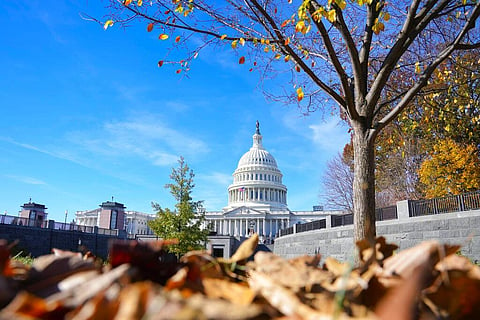

WASHINGTON: As part of Tuesday's midterm elections in the United States, voters cast ballots in around 100 referendums, some of which have life-changing implications.
This is what American voters decided:
Healthcare
It was no surprise that abortion rights, a major political issue in the run-up to the vote, featured on the ballot in several states.
And the referendums handed a series of victories to abortion rights activists. Voters in California, Vermont, and Michigan agreed to amend their state constitutions to include abortion rights.
More unexpectedly, voters in conservative and religious Kentucky rejected an anti-abortion measure, and preliminary results show Montana is headed in the same direction.
And in a country known for some of the world's highest healthcare costs, the issue of medical fees was also on the ballot. In South Dakota, a Republican state, a large majority of voters opted to expand access to the Medicaid health insurance program to more low-income earners.
Meanwhile, preliminary results show Arizona is on track to approve a measure to lower maximum interest rates on medical debt.
Slavery
More than 150 years after slavery was abolished, several states voted on an exception to the 13th Amendment, which allows for forced labour by prisoners.
Alabama, Oregon, Tennessee, and Vermont voted to prohibit enslavement or involuntary servitude as punishment for crimes or payment of debts or fines.
The votes will not automatically change conditions for prisoners but could lead to legal proceedings.
Only Louisiana rejected the proposal after the text of the referendum had been criticized as too convoluted. Some 20 states still authorize this type of forced labour.
READ | Biden hails 'good day for democracy' as Republicans fall short
Recreational drugs
Issues around the recreational use of drugs are popular in US referendums, and this year was no different. Arkansas, North and South Dakota voted against legalizing the recreational use of marijuana and authorizing limited possession of pot.
However, Maryland and Missouri residents voted in favour and will join 19 other states and Washington, where it is already legal.
In Colorado, votes are still being counted in a referendum which seeks to decriminalize the possession and use of so-called "magic mushrooms" and other psychedelic natural substances.
Minimum wages
A vast majority of voters in the capital Washington -- a Democrat stronghold -- voted for employees who work for tips to earn the minimum wage of $16,10 by 2027.
These employees, who mainly work in the food service industry, have until now earned a minimum of $5,35 per hour. Nebraska voters approved a similar initiative, to see the state's minimum wages rise progressively from $9 to $15 by 2026.
Electoral laws
Tuesday's election also highlighted tensions around voting rules in the United States. Accusations of fraud have flourished among Republican voters, despite being repeatedly dismissed by authorities.
Several referendums grew from efforts to contest the results of the 2020 presidential election and called for changes to rules governing elections.
Connecticut and Michigan chose to legalize early voting in elections, while Nebraska agreed on a measure obliging voters to provide photo identification when casting their ballot in future elections.
ALSO READ | GOP in struggle to break Democrats' hold on Congress